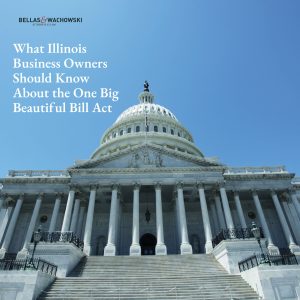 A New Era of Tax Policy for Business Owners
A New Era of Tax Policy for Business Owners
On July 4, 2025, the One Big Beautiful Bill Act (OBBBA) was signed into law, ushering in sweeping changes to the federal tax code. While the law has drawn national attention for its b
roader political implications, it contains several key provisions that Illinois business owners should take seriously. These changes affect everything from depreciation schedules and pass-through deductions to employer tax credits and employee compensation planning.
For business owners looking to reinvest, expand, or restructure, the OBBBA presents timely opportunities to reduce tax burdens and streamline growth, especially when coordinated with Illinois-specific considerations.
Key Tax Benefits in the OBBBA
One of the most impactful changes is the permanent extension of several business-friendly provisions originally enacted under the 2017 Tax Cuts and Jobs Act. Chief among these is the Section 199A deduction, which allows a 20% deduction on qualified income for pass-through entities such as LLCs, S corporations, and partnerships. For Illinois
entrepreneurs operating under these structures, this creates long-term certainty and substantial federal tax savings.
The OBBBA also reinstates 100% bonus depreciation, letting businesses fully deduct the cost of qualified property, such as equipment and machinery, in the year it is placed into service. Additionally, the Section 179 expensing limit is increased to $2.5 million, giving small and midsize businesses more flexibility to write off major purchases without complex depreciation schedules.
Illinois businesses investing in infrastructure, technology, or vehicles stand to benefit the most from these updates. However, it is important to coordinate federal deductions with Illinois tax law, which may not conform to all of these federal changes.
Additional Incentives and Individual Deductions
Beyond business investment provisions, the OBBBA introduces or expands several deductions that could influence compensation planning and employee benefits. Notably, it includes new individual deductions for:
•Up to $25,000 in tip income
•Up to $12,500 in overtime pay
•Up to $10,000 in car loan interest on qualifying vehicles
It also raises the Child Tax Credit to $2,200 per child and enhances deductions for seniors. While primarily designed for individual taxpayers, these provisions may guide how employers design wages, incentives, and benefit structures in a competitive labor market.
How Illinois Business Owners Can Respond
To make the most of these provisions, Illinois employers should take the time to review their operations and tax strategies. Key areas to focus on include:
•Capital investments – Evaluate current or planned purchases to take advantage of bonus depreciation and expanded Section 179 limits.
•Entity structure – Ensure your business is structured to qualify for the 199A deduction and other pass-through benefits.
•Employee benefits – Consider offering childcare assistance, wellness programs, or retirement contributions that now qualify for expanded employer tax credits.
•Compensation planning – Review payroll and incentive structures in light of new individual deductions, especially in service-based or tipped industries.
These updates offer clear financial opportunities, but only if implemented strategically and with awareness of both federal and state tax implications.
Broader Context: Budget Tradeoffs and Business Considerations
While the tax relief measures are substantial, the OBBBA also includes deep cuts to social programs such as Medicaid and SNAP, introduces new work requirements for federal aid, and expands funding for border enforcement. These policy shifts could impact industries such as healthcare, retail, and hospitality, particularly in lower-income areas or rural parts of Illinois that rely more heavily on federal support.
Additionally, analysts estimate the OBBBA will add between $3 and $4 trillion to the national deficit over the next decade. If future legislation attempts to offset this by scaling back credits or increasing rates, business owners who plan ahead now will be better positioned to absorb potential changes down the line.
Contact Us
If you are unsure how the OBBBA affects your business or want to review whether you are structured to maximize these new incentives, our attorneys are here to help. At Bellas & Wachowski, we work closely with Illinois business owners to navigate tax law, employment strategy, and compliance in a constantly changing legal landscape.
Contact us today at (847) 823-9030 to schedule a consultation and stay ahead of these changes.
 Chicago Business Attorney Blog
Chicago Business Attorney Blog

